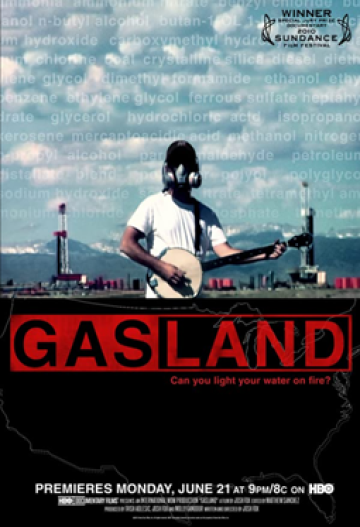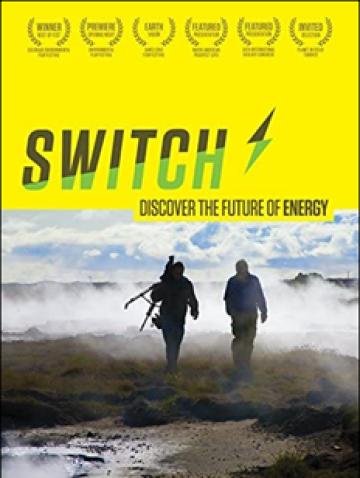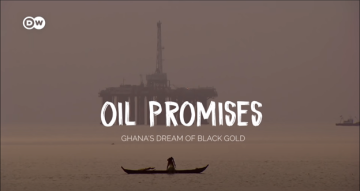Documentaries are used both to educate and tell stories that their makers believe should be heard. That applies to documentaries about the inner workings of various industries such as oil and gas.
To many outside the petroleum industry, those inner workings are a black box: Money and engineering goes in, gasoline and petrochemical products come out. It is also full of stories, making it an industry ripe for documentarians. The following reviews consider a small handful of the documentaries covering the petroleum industry and what might be learned from them beyond their immediate message.
Gasland (Josh Fox, 2010)

One of the most (in)famous documentaries concerning the oil and gas industry, Gasland is short on facts and long on feelings. Nonetheless, it offers an important lesson to the industry. Beginning in the Marcellus Shale, Fox travels to shale basins across the US where oil and gas operations overlap with the day-to-day lives of ordinary Americans. He invites them to tell their stories while expounding on what he believes to be the unregulated harm caused by every step in the life of an unconventional well.
One theme in particular stands out throughout Gasland: None of the aggrieved parties feels they have been heard by the operators near them or by government agencies who should be addressing their concerns. The documentary is not concerned with bad engineering as much as bad community relations. During the initial shale boom, oil and gas operations moved into areas that did not have large-scale operations, bringing the companies into contact with a population that had no familiarity with the industry. Inadequate environmental, social, and governance (ESG) protocols failed in the development of a social license to operate: If outreach efforts had been adequate, Gasland would never have been made.
Gasland is important as an indicator of the consequences of failing to properly engage the communities in which the industry operates, a lesson that the American industry has taken to heart in the decade since the documentary was released.
Improved technologies and best practices (such as quiet fracture fleets and use of produced water when feasible) help reduce the acute impact of local operations. Equally important, though, is improved and proactive outreach designed to explain the petroleum process and highlight the widespread benefits it brings.
Fox’s inaccuracies were less attributable to malice than they were to the understandable difficulty in making sense of the entire lifecycle of a well and associated regulatory regimes.
As the experts in the field, it is the industry’s responsibility (and in its own best interest) to help disseminate accurate information every step of the way. The industry has become bolder in standing up for itself as a crucial industry and force for good, even if it has to do so tongue-in-cheek, as the Colorado Oil and Gas Association recently did when it recognized The North Face with an “Extraordinary Customer” award.
Public outreach will become even more crucial as prospective investors weigh ESG factors ever more heavily before making investment decisions. The industry is rightfully proud about its role in improving the lot of humanity—as well as its ability to overcome engineering and regulatory obstacles in the process—but it must continue to expand its message to the broader population.
“Can’t we build a solar panel instead?” muses Fox at one point. Perhaps he would have been less eager about that alternative if he had also looked into the environmental impact of mining rare earth metals. Or perhaps he doesn’t mind so long as it’s not in his backyard.
Switch (Harry Lynch, 2012)

Switch features an analysis of the world’s energy outlook, provided by Scott W. Tinker, an American geologist, educator, and energy expert. It is a product of the Switch Energy Alliance, a nonpartisan, nonprofit, organization dedicated to providing energy education. Over the course of his analysis, Tinker travels the world, searching out prime examples of different energy sources and experts to discuss them with.
Premiering in 2012, in some regards Switch shows its age. Some of the concerns addressed include shrinking oil supply and problems of energy storage for intermittent renewables. While neither of these are solved problems today, technological advancement has changed the landscape significantly in both arenas. However, this does not detract from the overall quality or message Tinker wants to convey.
His central question is: What will the energy transition look like? On his journey, he evaluates coal, oil, biofuels, natural gas, wind, solar, hydropower, geothermal, and nuclear on their merits and shortcomings as potential energy sources of the future.
Coal and oil are dominant because of their economics. Their abundance, energy density, and transportability are unrivaled by any other option. As a result, he concludes, it is unreasonable to expect developing, industrializing nations with large populations and growing middle classes (i.e., China and India) to ignore a resource that all industrialized countries have leveraged in their development journey. Unfortunately, Tinker does not believe that cleaning emissions from these sources at scale will be economical, meaning the world will have to live with increasing atmospheric CO2 concentrations and associated consequences. The challenge, then, is for alternate energy sources to maintain the advantages of coal and oil while minimizing disadvantages at an economically competitive price.
Unfortunately, all existing alternate sources face various issues that prevent them from meeting these criteria. Geothermal, hydropower, solar, and wind power require specific geologies or climates to make them viable. Moving power away from these locations requires transmission infrastructure. Solar and wind also suffer from intermittency issues that require efficient energy storage, reliable baseline capacity, or both. Nuclear requires significant upfront investment, an extraordinarily long lead time, and the savvy to overcome the stigma of public perception.
While alternate energy sources are superior to conventional sources in that they do not produce harmful emissions, Tinker does fail to consider other issues surrounding many alternate sources —the cost and impact of building and decommissioning them. What is the impact of mining the rare earth minerals necessary to build solar panels at scale? What is the downstream impact of damming rivers to generate hydropower? What will be done with the blades of decommissioned wind turbines or the heavy metals of decommissioned solar panels? These are nontrivial considerations when determining whether an alternate energy source is superior to existing ones.
Tinker concludes by emphasizing that energy efficiency, including personal energy conservation, will play a vital and growing role in a successful energy future. “The most important thing is to change the way we think about energy so we can change the way we use it,” he said.
Oil Promises: Ghana’s Dreams of Black Gold (Elke Sasse, Andrea Stäritz, and Ebele Okoye, 2020)

This recent documentary about Ghana spans a period of 10 years, documenting the soaring hopes of the Ghanaians after the discovery of oil offshore in 2007. It captures the aftermath of the intersection of dreams and globalization.
With the discovery of oil, dreams, hopes, and promises went sky high in local communities. They coveted prosperity and advancement into a modern world. Residents in villages along the coast were promised better lives, access to electricity, clean water, employment, and quality education.
Once Jubilee Field began producing in 2010, residents in nearby villages envisioned a petrochemical industry that would uplift their communities. Politicians and investors preached the dawn of a new era for Ghana and how it would become an “African Tiger.” High hopes swept the nation as Jubilee Field was portrayed as a win for all stakeholders. Oil Promises delves into the dreams of individuals from the coastal villages and how their lives might change for the better. The documentarians are clearly skeptical, but hope against hope that Ghana will not follow the unfortunate fate of the Nigeria, a country that exports oil, but has to import gasoline.
Fast forward to 2012, and promises remain unfulfilled. The village and its inhabitants are still searching for necessities such as electricity and water, much less improved housing facilities and luxury hotels. Moreover, Ghanaian fishermen are facing difficulty due to the increased algae in the sea, which is potentially attributed to offshore operations. There are some hopeful signs: A farmer has started training in a technical learning center and a hawker has started to operate machinery for the construction of a gas-processing facility.
The story jumps to 2014, but no further progress or improvement has been seen by the villagers. On the contrary, the farmer and the hawker are rendered jobless as the contract for building the facility and laying gas pipelines is handed over to a Chinese firm that has brought its own workers. There are modern housing units, however, only for the foreign engineers. The people of Ghana have seen no improvement since the discovery of Jubilee Field. The documentarians are clearly frustrated with the patience of the locals and their unwillingness to speak up for themselves.
The documentary ends 10 years after oil production begins. The irony is depicted by the conversion of dirt roads to cemented pathways—locals cannot afford to own cars—and the addition of taps for clean drinking water—there is no water flowing through them. With patience waning and frustration mounting, the villagers have started to call this black gold a curse rather than a blessing.
Ghana is hardly the first country to overpromise or underdeliver on the benefits of local oil and gas development, but this is all the more reason that both the government and the operators should have been prepared. Good ESG is important in any new project, but especially so when it brings a windfall to a region unfamiliar with bountiful natural resources.
Likewise, setting realistic expectations (and delivering on them) while minimizing negative externalities is integral to maintaining a social license to operate. If the residents of the villages along Ghana’s coast had prospered in the ways they were promised, this documentary could never have been made.
These documentaries, while not always factually accurate or comprehensive in their considerations, are nonetheless instructive. They provide a looking glass that allows the industry to better understand how it is perceived outside its black box and offer lessons on how to approach the public to improve that image. Even when the technical information is basic, outdated, or missing, the story or stories yield important information as the industry becomes an even bigger topic of conversation.
Already watched the documentaries reviewed here? Consider these…
- The Prize: The Epic Quest for Oil, Money, and Power (Various, 1992–93). A miniseries adaptation of Daniel Yergin’s bestselling, Pulitzer-Prize-winning book by the same name, The Prize is the definitive history of the petroleum industry and its impact on the world’s economy and geopolitical situation.
- Switch On (Harry Lynch, 2020). In this sequel to Switch, Scott Tinker takes another global journey. This time he travels to regions of energy poverty that stand to gain the most from the widespread dissemination of cheap, clean, reliable energy sources.
- Gasland Part II (Josh Fox, 2013). Fox continues his assault on hydraulic fracturing, disputing the claim that natural gas is a safe, clean energy source.
…or choose from more than 50 titles from IMDB’s list of Best Documentary Films about Oil (and Gas).

